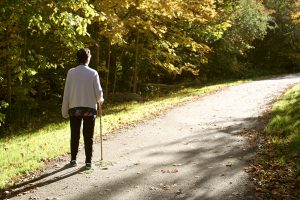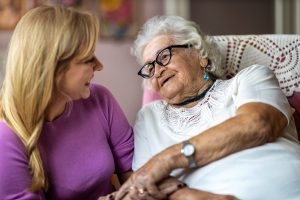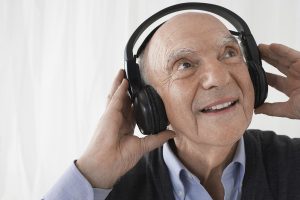 Ask a doctor about Alzheimer’s and you’ll likely learn that by the time you’re 80, you have a 50/50 shot of having this form of dementia. Alzheimer’s disease affects everyone differently.
Ask a doctor about Alzheimer’s and you’ll likely learn that by the time you’re 80, you have a 50/50 shot of having this form of dementia. Alzheimer’s disease affects everyone differently.
Some patients become agitated and angry, but others become more doting and loving. Some become housebound while others develop an urgency to get outside and walk. If you worry that your dad is going to start wandering, these steps make it easy for everyone.
Get a Smartwatch or Smartphone and Turn on GPS Tracking
If you can, get your dad to carry a smartphone or smartwatch. Make sure GPS tracking is turned on. If it is and he gets outside, you’ll know where he is and can step in and redirect him home when needed.
Place Locks in Unusual Places
Your dad is going to figure out standard locks. Put them in different places to trick him. Install a sliding latch low to the floor or on the top of the door sill. Use a pressurized shower curtain rod to keep him from being able to open a sliding door or window.
Put in Alarms
Door and window alarms help keep your dad from wandering off. If he does open a door or window to go outside, you’ll hear the alarm and follow him before he has a chance to go far. Bed alarms also help you know if he’s gotten out of bed.
When your dad does get outside, he may not want to come back inside immediately. Let him walk. What’s important is that someone has joined him and can help him find his way back home when he’s tired of walking.
Make Sure He Has Around-the-Clock Care
Someone needs to be on-duty at all hours. Your dad’s sleep patterns may change because of Alzheimer’s. You may find that he’s only sleeping two or three hours a day. If someone is alert when you’re trying to sleep, it helps.
When you’re up, the person who took the late-night shift can get some sleep. Around-the-clock care will make it easy. One way to do this is by pairing family caregivers with professional caregivers.
Talk to a senior care agency about your dad’s symptoms with Alzheimer’s disease. Let the specialist know if he’s prone to angry outbursts, has developed a sweet tooth that makes mealtime difficult to manage, or is starting to wander.
A customized senior care plan ensures he’s safe and as happy as he can be. It also gives you the chance to take breaks as often as needed so that you get to reduce stress and enjoy a level of socialization that you might otherwise skip.
 Over time, some people find their kidneys slowly stop working correctly. Chronic kidney disease affects 37 million adults in the U.S. Early detection is important as it can keep the disease from progressing into kidney failure.
Over time, some people find their kidneys slowly stop working correctly. Chronic kidney disease affects 37 million adults in the U.S. Early detection is important as it can keep the disease from progressing into kidney failure. While dementia and Alzheimer’s disease remain a scientific quandary, they are not as inevitable as we thought in the past.
While dementia and Alzheimer’s disease remain a scientific quandary, they are not as inevitable as we thought in the past. Current recommendations for exercise are at least 30 minutes a day, 5 days a week. How well do your parents do with this? They may not have found an exercise they love. Have you thought about dance?
Current recommendations for exercise are at least 30 minutes a day, 5 days a week. How well do your parents do with this? They may not have found an exercise they love. Have you thought about dance? There’s a moment when you might suddenly realize that you’re a family caregiver and you didn’t expect it. You might have known that you would eventually be your senior’s caregiver, but things change quickly when it comes to helping someone you love with the challenges of aging. Getting started the right way, even if you’ve been caregiving longer than you realize, is important.
There’s a moment when you might suddenly realize that you’re a family caregiver and you didn’t expect it. You might have known that you would eventually be your senior’s caregiver, but things change quickly when it comes to helping someone you love with the challenges of aging. Getting started the right way, even if you’ve been caregiving longer than you realize, is important. A senior’s nutritional level can greatly impact their overall physical and mental health. However malnutrition is on the rise, threatening the health and wellbeing of many seniors. It’s important for family caregivers of seniors to recognize the signs of malnutrition in seniors.
A senior’s nutritional level can greatly impact their overall physical and mental health. However malnutrition is on the rise, threatening the health and wellbeing of many seniors. It’s important for family caregivers of seniors to recognize the signs of malnutrition in seniors. Dementia is complicated enough, but your senior might be experiencing depression at the same time. This can be difficult to help her to manage, especially if her dementia has progressed to the point that she’s unable to communicate to you what’s wrong. There may be more that you can do for her than you thought possible, however.
Dementia is complicated enough, but your senior might be experiencing depression at the same time. This can be difficult to help her to manage, especially if her dementia has progressed to the point that she’s unable to communicate to you what’s wrong. There may be more that you can do for her than you thought possible, however. Music can be great to listen to, but there is much more to it than that. Research shows that there are numerous benefits to music for the elderly. It can trigger emotions, help one process their feelings, and improve overall well-being. This is just be beginning. Learn more here today about what music can do for your elderly loved one. Once you know the benefits of music for your loved one, you will understand why it is so important for your loved one to have music in their life.
Music can be great to listen to, but there is much more to it than that. Research shows that there are numerous benefits to music for the elderly. It can trigger emotions, help one process their feelings, and improve overall well-being. This is just be beginning. Learn more here today about what music can do for your elderly loved one. Once you know the benefits of music for your loved one, you will understand why it is so important for your loved one to have music in their life. Heart failure is a very serious illness and it can lead to declining health very quickly. Your elderly family member may find that after she’s diagnosed with heart failure it’s more important than ever that she takes her health seriously. Unfortunately, there are simple ways that she could accidentally worsen her heart failure.
Heart failure is a very serious illness and it can lead to declining health very quickly. Your elderly family member may find that after she’s diagnosed with heart failure it’s more important than ever that she takes her health seriously. Unfortunately, there are simple ways that she could accidentally worsen her heart failure. Low blood pressure sounds like something that isn’t really a problem, but if blood pressure falls too low, it can definitely be a problem. Learning as much as possible about
Low blood pressure sounds like something that isn’t really a problem, but if blood pressure falls too low, it can definitely be a problem. Learning as much as possible about